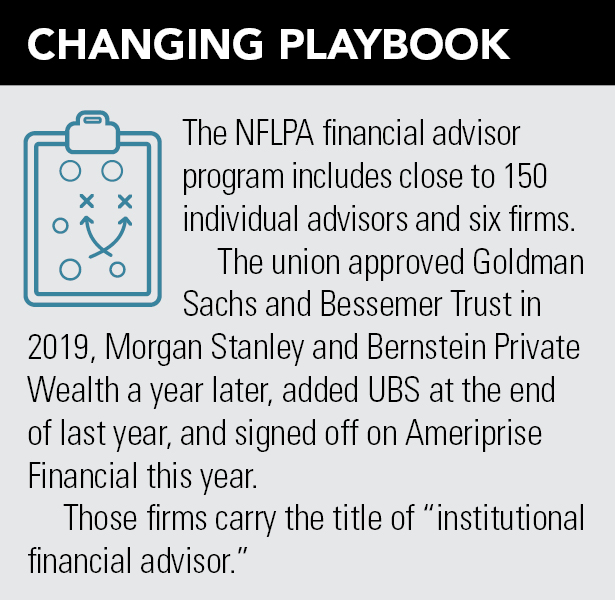

National Football League players continue to be plagued by several serious financial problems, despite their union’s decades of efforts to protect the players from predators and fraudsters, and sometimes from themselves.
For years, the NFL Players Association, or NFLPA, has been offering its roughly 2,000 players a unique program to provide the members of its union with qualified financial advisors.
Now 22 years old, the NFLPA advisor program in the past five years has shifted its initial focus from signing off only on union-vetted individual advisors to also endorsing big-name, powerhouse financial institutions, including Goldman Sachs and UBS, two of the preeminent names in the business of managing wealthy individuals’ money.
Professional football players are a unique bunch when it comes to their finances: They have a higher rate of bankruptcy than their compatriots who play professional baseball, basketball, and hockey for a living. Their careers are shorter, they get paid less, and, if they divorce after ending their careers, they often wind up paying alimony based on past, not current, earnings.
Despite the NFLPA’s years of work to give current and former players financial protection, some continue to have significant financial problems.
Bill Romanowski, who played in the NFL from 1988 to 2003, and his wife in April filed for bankruptcy amid allegations they owe the US government millions of dollars in unpaid taxes, according to a report in USA Today. An outside linebacker, Romanowski, 58, played with the Denver Broncos, San Francisco 49ers, and two other teams, winning four Super Bowl rings.
And Marcus Burley, who played professionally from 2014 to 2017, filed for individual Chapter 11 bankruptcy protection earlier this year after a salad restaurant franchise in North Carolina failed, according to a report in the Charlotte Business Journal. A cornerback, Burley started his career with the Seattle Seahawks and ended with the Houston Texans.
When the NFLPA started the program, it vetted individual financial advisors, giving the OK to as many as 400. After the 2008 financial crisis that saw current and former players, including superstar quarterback John Elway, ensnared in alleged Ponzi schemes or legal battles over failed investments, the program changed and in 2014 began to emphasize financial institutions as well as advisors.
The number of individual financial advisors has dropped to about 150, while the program has approved six firms, which carry the title of “institutional financial advisor.”
While the program has evolved, it’s not clear to what extent players are using it. In an email, the NFLPA said it was unable to provide exact numbers of players that use its financial programs due to privacy policies.
Despite the NFLPA’s guard rails, players still face plenty of financial risk, one attorney said.
“Players are definitely better off than 40 years ago, when guys had second jobs in the landscaping business,” said Quentin Williams, an attorney who has worked with professional athletes. “Now they’re making real money with minimums in place and potential generational- spanning wealth.
“But the players need to be active participants in business affairs and not deferring to everybody else because all they want to do is play ball. They’re still investing in restaurants, car washes, gyms, and nightclubs. Just because they make a lot of money doesn’t mean they’re good businesspeople.
“Yes, they are better off but in a way worse off because they have the opportunity, yet many are still blowing it. The players have no experience or education regarding money and finances, and some of the professionals out there are pros at taking money.”
“These players perform at such an elite level, they think they can play a lot longer than they really can,” said Chase Crump, a recently approved advisor in the NFLPA’s program. “But the NFL is a brutal sport; it’s a modern-day blood sport.”
“Lots of players come from large families and that dynamic is different,” Crump said. “Once a player makes it, the whole family thinks it has, and there can be 10 people. Think of the stress that creates. Add in the pain of injury and mental health issues.”
Crump said the NFLPA’s financial program had more requirements than other designations, including a two-year waiting process in his case. The stakes are incredibly high for players and financial advisors. “Players don’t get a do-over after an injury, or from making a bad decision with money,” he said.
The NFLPA believes in its financial program for players.
“We believe that this program is having a positive impact,” wrote Dana Shuler, senior director of the NFLPA’s player affairs department, who oversees the financial programs for players. “Players can verify whether individual advisors are registered with the NFLPA, which indicates that the advisor has at a minimum met the eligibility criteria. Furthermore, advisors registered with the NFLPA must undergo an annual background investigation to confirm their eligibility.
“For the institutions, the NFLPA requires each entity to designate advisors that meet the established eligibility criteria and to monitor their compliance. Additionally, each institution has agreed to back the advisors they designate, meaning the institution will be held responsible should a designated advisor run afoul of the regulations.”


Canadian stocks are on a roll in 2025 as the country prepares to name a new Prime Minister.

Two C-level leaders reveal the new time-saving tools they've implemented and what advisors are doing with their newly freed-up hours.

The RIA led by Merrill Lynch veteran John Thiel is helping its advisors take part in the growing trend toward fee-based annuities.

Driven by robust transaction activity amid market turbulence and increased focus on billion-dollar plus targets, Echelon Partners expects another all-time high in 2025.

The looming threat of federal funding cuts to state and local governments has lawmakers weighing a levy that was phased out in 1981.
RIAs face rising regulatory pressure in 2025. Forward-looking firms are responding with embedded technology, not more paperwork.
As inheritances are set to reshape client portfolios and next-gen heirs demand digital-first experiences, firms are retooling their wealth tech stacks and succession models in real time.
